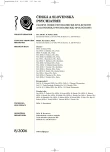-
Medical journals
- Career
Stimulation of Prefrontal Cortex and Therapy of Negative Symptoms of Schizophrenia
Authors: R. Přikryl; E. Češková; H. Kučerová; T. Kašpárek; L. Ustohal; I. Palčíková
Authors‘ workplace: Psychiatrická klinika LF MU a FN Brno přednostka prof. MUDr. E. Češková, CSc.
Published in: Čes. a slov. Psychiat., 102, 2006, No. 8, pp. 416-422.
Category: Comprehensive Reports
Overview
Negative symptoms are regarded as the most persistent and disabling component of schizophrenia. The possibility of influencing them by means of antipsychotics remains problematic. Repetitive transcranial magnetic simulation (rTMS) presents a new opportunity for influencing negative schizophrenic symptoms. A theoretical justification of the effect of rTMS on negative schizophrenic symptoms can be seen in the fact that high-frequency rTMS has an activating impact on cortex neurons. The negative correlation between activity of the frontal cortex and severity of negative symptoms has been proved repeatedly. Another important fact is that dopamine can be released in the mesolimbic and mesostriatal brain systems by high-frequency stimulation of the frontal cortex. There are hardly any consistent published data mapping the subject in clinical practice.
Key words:
frontal cortex, treatment, negative symptoms, rTMS, schizophrenia, stimulation.
Labels
Addictology Paediatric psychiatry Psychiatry
Article was published inCzech and Slovak Psychiatry

2006 Issue 8-
All articles in this issue
- Cognitive Changes after Resective Surgery for Medical Refractory Temporal Epilepsy in Relation to the Side of Surgery
- Stimulation of Prefrontal Cortex and Therapy of Negative Symptoms of Schizophrenia
- Bipolar Affective Disorder in Children and Adolescents
- Risk Factors of Child and Adolescent Suicidality
- Membranes III: Significance of the State of Membrane for the Specific Cell Functions
- Case Reports - Other Association
- Czech and Slovak Psychiatry
- Journal archive
- Current issue
- Online only
- About the journal
Most read in this issue- Bipolar Affective Disorder in Children and Adolescents
- Stimulation of Prefrontal Cortex and Therapy of Negative Symptoms of Schizophrenia
- Case Reports - Other Association
- Risk Factors of Child and Adolescent Suicidality
Login#ADS_BOTTOM_SCRIPTS#Forgotten passwordEnter the email address that you registered with. We will send you instructions on how to set a new password.
- Career

